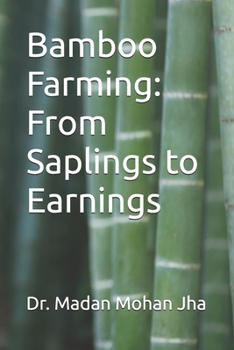Bamboo Farming: From Saplings to Earnings
Bamboo Farming: From Saplings to Earnings" is an insightful guide that delves into the comprehensive process of bamboo cultivation, from the initial stages of planting to the ultimate goal of reaping financial rewards. Authored by Dr. Madan Mohan Jha, an expert in the field of education and research, this book combines scientific knowledge with practical advice, making it an invaluable resource for both novice farmers and seasoned agricultural professionals.
The book begins with an introduction to bamboo as a versatile and sustainable resource, highlighting its importance in various industries such as construction, furniture, paper production, and even the culinary arts. Dr. Jha emphasizes the environmental benefits of bamboo farming, including its ability to restore degraded land, reduce carbon dioxide levels, and support biodiversity. This introductory section sets the stage for readers to appreciate the economic and ecological potential of bamboo.
In the subsequent chapters, Dr. Jha meticulously guides readers through each step of the bamboo farming process. Starting with the selection of suitable bamboo species, the book covers the nuances of soil preparation, sapling procurement, and the optimal conditions for planting. Special attention is given to the climatic and geographical factors that influence bamboo growth, ensuring that farmers can tailor their practices to their specific regions.
As the saplings take root, the book shifts focus to the maintenance and care required to ensure healthy bamboo growth. Dr. Jha discusses irrigation techniques, pest management, and the use of organic fertilizers, all of which contribute to a robust and sustainable bamboo plantation. The importance of timing in harvesting is also addressed, with guidelines on how to achieve the best yield and quality of bamboo culms.
A significant portion of the book is dedicated to the economic aspects of bamboo farming. Dr. Jha provides a detailed analysis of the market demand for bamboo products, both domestically and internationally. He offers practical advice on how to establish connections with buyers, negotiate fair prices, and explore various revenue streams such as selling raw bamboo, creating value-added products, or even entering niche markets like bamboo-based textiles or eco-friendly packaging.One of the book's strengths lies in its real-world case studies and success stories. Dr. Jha includes examples of successful bamboo farmers who have turned their small-scale plantations into thriving businesses. These case studies provide inspiration and practical insights, showing readers that with the right knowledge and dedication, bamboo farming can be a highly profitable venture.
The book concludes with a forward-looking perspective on the future of bamboo farming. Dr. Jha discusses the role of bamboo in sustainable development and its potential to contribute to global goals such as poverty alleviation and climate change mitigation. He also touches on the innovations in bamboo processing and the emerging trends in the global bamboo market.





